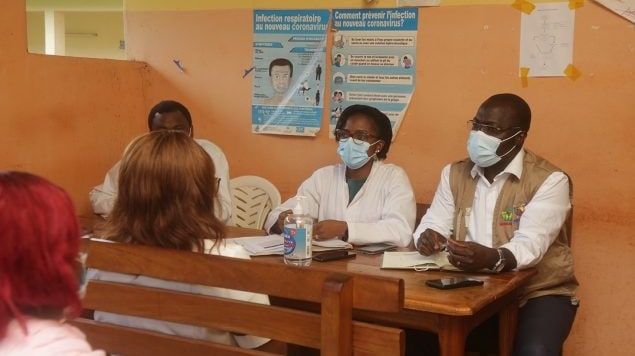Key points
On February 13, 2023, Equatorial Guinea announced an outbreak of Marburg virus disease (MVD). MVD is a rare but severe and often fatal hemorrhagic fever. This announcement alerted the authorities of Cameroon, a neighboring country, who activated the National Public Health Emergency Operations Center (EOC). Officials deployed two interdisciplinary rapid response teams to the southern border area within 24 hours. The EOC coordinates emergency responses across the government and other partners.

Approach
Partnering to build stronger systems
Since Global Health Security Agenda activities launched in Cameroon in 2015, CDC has supported the Cameroon Ministry of Public Health (MOH) in developing sustainable public health capacity and infrastructure. This led to the quick activation of the EOC. CDC and the U.S. Defense Threat Reduction Agency provided funding and technical assistance to establish the EOC, including training national and regional staff. In addition, CDC supported the establishment and renovation of the National Public Health Laboratory through the United States President's Emergency Plan for AIDS Relief (PEPFAR). This laboratory provides leadership and guidance to a vast network of laboratories across the country to improve and expand testing capacity.
CDC also works with Cameroon to develop disease surveillance systems to better detect and track possible outbreaks. CDC has assisted Cameroon to revise its integrated disease surveillance case definitions and develop new training modules to accompany the dissemination of the new surveillance standards. Together, CDC and MOH implemented the Cameroon Field Epidemiology Training Program (CAFETP) to increase the number of qualified disease detectives. Since its inception in 2010, the program has trained more than 1,100 field epidemiologists and works with neighboring countries in Central Africa to build their workforces as well.
Relying on expertise from across CDC to support Cameroon
Prior to the MVD declaration, the COVID-19 response tested Cameroon's capabilities and demonstrated that, with CDC assistance, the MOH has made significant strides in strengthening incident management systems at regional and district levels across the country. They are efficiently surveilling disease trends and analyzing real-time data, coordinating effectively, and building a strong national and sub-national public health workforce. "COVID is also an important lesson in how assets from across CDC's programs can be quickly leveraged to support global health security," says Dr. Mohamed Jalloh, CDC Cameroon Country Director. "For example, laboratory improvements to expand and strengthen HIV testing enabled COVID-19 identification and tracking."
Mounting a rapid response to a potential outbreak
Thus, when Equatorial Guinea announced the MVD outbreak, the Cameroon MOH was ready to respond. In addition to activating the EOC within 24 hours, Cameroon worked with CDC and the World Health Organization to update their Viral Hemorrhagic Fever Response plan to identify gaps and develop strategies to address them. CAFETP residents were also incorporated at all levels of the response, including field investigation teams, to support case identification and contact tracing.
Furthermore, the MOH Rapid Response Teams received a refresher training for alert response and briefings on the potential for a MVD outbreak in Cameroon. CDC Cameroon trained 20 Advanced CAFETP residents in proper personal protective equipment procedures, contact tracing methods, and safe burial practices.
Impact
The success of the partnership between CDC and the Cameroon MOH is evident in the MOH's initial reactions and continued response to the MVD outbreak in Equatorial Guinea. With the support of CDC, the Cameroon MOH has been able to build robust incident management systems and a strong workforce to respond public health emergencies. There have been no cases confirmed in Cameroon despite frequent travel from Equatorial Guinea and high risk for MVD spread.
